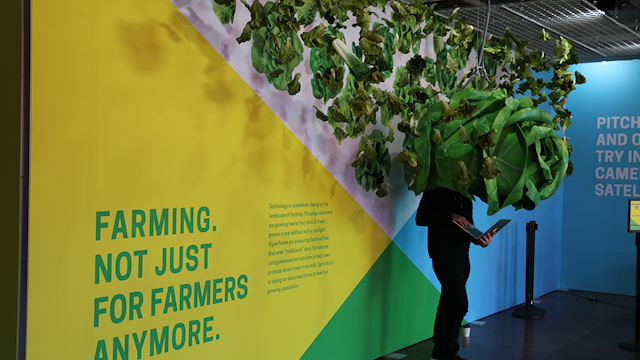Changing the narrative about food at SXSW
One might not necessarily connect agriculture and technology, but at SXSW, dairy brand Land O'Lakes created The Food Effect, an installation designed to spark conversation and dialogue about the way food is grown. The exhibit was meant to enlighten those who may not see the connection between our farms and tables, and erase misconceptions about modern farming practices, including GMOs.

The Food Effect at SXSW
“SXSW is, in my mind, the foremost place for thought leadership in the world, “ said Tim Scott, chief marketing officer for Land O'Lakes. “One hundred thousand people are coming together who are forward-thinking and anxious to learn.”
Education is a critical consideration for the brand. As agriculture changes — especially related to technology — there are misperceptions of what farming is today. Particularly challenging is the fact that just over 1% of people in America are involved in farming yet Scott believes that it is an exciting and viable career.
“[Farming] is all technology,” he said. “People think about the farmer in overalls, a big red barn and getting up at two in the morning to milk the cows. Those days are gone.”

Indeed, at The Food Effect, festival-goers were treated to engaging conversations and immersive, interactive displays that showed how farming is evolving. A virtual reality experience displayed farming techniques in action — inside a giant head of lettuce. A large-scale, live mapping project showed how satellite imagery helps farmers grow crops more efficiently. An exhibit on how carbon capture in the soil helps reduce carbon dioxide in the atmosphere also enlightened the audience.

One of the more popular displays was a bank of phones that benefited Feeding America, a long-standing Land O'Lakes partner. Four of the phones featured first-person stories from two people who benefited from the program and two farmers (including a dairy farmer in Kenya) working to help feed people who don't have enough food. For every conversation listened to, a meal was donated, with over 6,000 going to the organization.

“It's easier when you wrap your head around insecurity right here at home when you hear a young person's voice on a telephone [and] that they don't want summer to come because they don't have food. This is not the way that it should be and we can fix it,” said Scott. “Morally we owe it to the world; we owe it to our company, we owe it to ourselves.”
Another eye-catching display told the story of gene editing. The idea was to engage more of a conversation around genetically modified organisms (GMOs) and how, despite the current public opinion on GMOs, they are, in fact, useful in many instances — especially drought-resistant corn and papayas, which were almost obliterated from Hawaii in the 1990s due to the Ring Spot virus.

“The problem with the GMO discussion is that people were late to the party,” noted Scott. “I think what's happening is that people are associating those three letters with big ag and bad ag. There is nothing, not even one proven scientific study, which says genetically modifying plants to make them stronger, to make them better, to make them more robust harms human beings. I do believe we should have been having this GMO discussion ten years ago.”
What's telling is that, at SXSW — and especially among younger people — the message seems to break through, showing that legitimate education is powerful and the conversation can become more productive.
“I think you catch up in places just like this. You start talking to a younger audience, a group of prolific social followers and start changing the dialogue and educating people,” said Scott. “ It's not one side or the other; it's about transparency. We need to be transparent and honest with people about what the facts are, and the facts will lead them to the right place. I talked to several young people here at SXSW who said they didn't know the real story and they appreciated the honesty and education.”
In Scott's mind, there is also a great deal of confusion and a move by some brands and products to co-opt the GMO conversation akin to the practice of greenwashing, noting water and salt brands (neither of which can be genetically modified in the first place) that are claiming to be GMO-free.
“Frankly, shame on some of those marketers who are using that as a way to draw attention to their brand,” said Scott. “It's a cheap marketing tactic right now. It's one thing if you say you have 25% fewer calories or it's less fat or sodium. Those are claims that people need. GMO-free on a bottle of water is stupidity.”
Noting that Land O'Lakes supports all manner of farming — including organic and vertical — Scott pointed out that the sheer volume of food needs around the world demands a responsible, hybrid approach and that genetic modification has been around for generations.
“That Labrador Retriever that you have at home was genetically modified. It didn't come out of the woods,” he said. “The sweet corn that you eat has been genetically modified. It doesn't grow in the wild. People need to re-understand what it is. You're making things better you're not using mad science to change and make things dangerous.”
SaveSave
Content created with:


